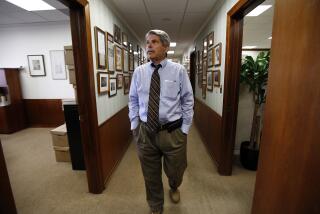Yaroslavsky Breaks With 2 Consultants
- Share via
Acting to head off a political crisis, Los Angeles City Councilman Zev Yaroslavsky on Tuesday said he would not hire a consulting firm that questioned Mayor Tom Bradley’s IQ and advised Yaroslavsky to bear down on the Jewish community for money to finance his mayoral campaign.
Yaroslavsky said that two confidential memos prepared for him by the consulting firm headed by Michael Berman and Carl D’Agostino contained statements that are “frankly offensive, contemptuous and insulting and I will have no part of it.”
Yaroslavsky’s damage control effort came hours after Mayor Bradley attacked the consulting firm’s “unprincipled and cynical” memos, excerpts of which were printed Tuesday in The Times. Bradley said that Yaroslavsky should fire the political consultants for their “outrageous” suggestions.
Race Issue
The mayor, echoing sentiments of other political and community leaders on Tuesday, said that the memos could be construed as racially divisive and were reminiscent of Bradley’s first two mayoral campaigns against former Mayor Sam Yorty in 1969 and 1973 when race became an issue.
Yaroslavsky told a crowd of reporters in his office Tuesday afternoon that he had not hired the Berman and D’Agostino (BAD) Campaigns firm to run his mayoral campaign and would not in the future.
“They are not my consultants nor are they any longer under consideration,” Yaroslavsky said. “I do not agree with many of their ideas and I find many of their statements to be insulting, insensitive and not reflective of my views.” Yaroslavsky said he and co-sponsor Marvin Braude had not yet decided whether to sever BAD’s association with their anti-drilling initiative on the November ballot. The firm has already received $50,000 this year to help pass the measure.
Braude told The Times that he had not seen anything in the newspaper account of the BAD memos that would persuade him to hire another firm. The Berman-D’Agostino firm, acknowledged experts in direct-mail campaigning, had worked with Braude and Yaroslavsky in their successful effort to pass Proposition U, the slow-growth measure, in 1986.
For its part, the consulting firm issued a short statement moments after Yaroslavsky’s news conference, expressing “regrets that our private, irreverent attempts at humor might have caused embarrassment or offense. Our record for support for candidates and causes clearly demonstrates our commitment for environmental protection, equal opportunity for all people and the highest level of integrity in government.”
Until Tuesday, it had been considered a relative certainty that Bradley and Yaroslavsky would square off next year when Bradley seeks an unprecedented fifth term. The furor over the BAD memos represents the worst political crisis Yaroslavsky has faced in his years-long quest to become mayor, and it was unclear even to the councilman whether the incident will hurt him in the upcoming campaign.
Ponders Question
Asked specifically if he felt the developments would affect his decision to run for mayor, the grim-faced Westside councilman paused several seconds before responding, “I don’t think so.”
Over the years, Yaroslavsky has often consulted with Berman and D’Agostino on political strategy, and one of BAD’s former employees, Ann Hollister, is now a Yaroslavsky deputy. The councilman would not discuss how the decision was made to drop BAD as a prospective campaign management firm for his mayoral bid, but sources close to the councilman said that in the aftermath of the outcry over the memos, both sides agreed that a severance should occur.
The draft memos were liberally peppered with irreverent, blunt and often unflattering descriptions of Bradley, liberals, environmentalists, Jews, homeowner groups and Yaroslavsky himself. They also heavily stressed the importance of Yaroslavsky tapping wealthy Jewish supporters to raise the money necessary to mount an effective mayoral campaign.
Anonymous Source
A copy of the two Berman-D’Agostino memos was delivered anonymously to The Times by someone who said in a phone call that she disapproved of the veteran firm’s tactics. As a result of the publication of excerpts, The Times also came under criticism for what Yaroslavsky and the consulting firm said were reprints from “stolen” documents.”
“Stolen property being put into the newspaper is sinking to a new low, but that’s another story,” Yaroslavsky said. “This is a free country and I respect the First Amendment as much as anybody and I have to live with it.”
William F. Thomas, editor of The Times, defended the publication of the excerpts.
“The memos arrived uninvited. We ascertained they were authentic and we have no knowledge to this day that they were or were not stolen. Since they clearly are relevant to current events and since they indeed are authentic, we printed them,” he said.
Yaroslavsky said he had determined that the copy of the memos furnished to The Times had been taken from a notebook owned by Hollister, but he did not know any other details. Hollister said the memos had apparently been taken from a three-ring notebook on her desk, copied and then replaced.
Yaroslavsky told reporters that in the Berman-D’Agostino memos that he saw, any references to religion and race had been excised. Yaroslavsky conceded, however, that the final draft had contained one of the memo’s more controversial statements, telling him that “The reason why BAD thinks you can beat Bradley is: You’ve got 50 IQ points on him (and that’s no compliment.) But your IQ advantage is of no electoral use if you don’t use it.”
No Apology
Although Yaroslavsky said he owed Bradley no apology, he added, “I did not share the views about IQs or anything else. I have a very high personal regard for Tom Bradley as I believe most people in this city do and I would not in any way countenance demeaning his personal stature, his intelligence or his commitment to what he thinks is in the public interest.”
Bradley’s chief deputy Michael Gage called the IQ comparison “racist,” but Bradley would not go that far.
“A campaign consultant may say anything,” Bradley said. “Talking about the relative intelligence of candidates is of no consequence. I’ve been in office for 25 years and I think I have demonstrated over the years my intelligence and my ability to handle the public’s problems.”
But the mayor went on to say: “It is my hope that there will be no return . . . to ethnic, racial campaigns; I’ve been through a couple of them with Sam Yorty . . . that was enough. This city doesn’t need any more of that.”
Other community and political leaders also expressed concern that the prospective campaign between Bradley, the city’s first black mayor, and Yaroslavsky, who hopes to become the first Jewish one, will degenerate into a racial and ethnically divisive battle.
Mark Ridley-Thomas, executive director of the Southern Christian Leadership Conference in Los Angeles, called the BAD memos “an assault with racial overtones that are patently inexcusable.”
Language of Memos
Thomas said the language “confirms some of the worst suspicions that some of us have had about the ethnic accent that would be applied to the Yaroslavsky campaign. I think the emphasis on the Jewishness of the proposition to the point of chauvinism breeds misunderstanding at best and hostility at worst.”
Neil Sandberg, Western regional director of the American Jewish Committee, said that the BAD memos, even in draft form, “. . . are very unfortunate because they contribute to polarization among groups in our community.”
Albert Wolf, rabbi emeritus of Wilshire Boulevard Temple, said that it had been “irresponsible” for The Times to print the excerpts from the BAD memos, particularly those that contained racial or ethnic slurs.
“For them to write it, I think it is terrible,” Wolf said. “For The Times to print it, I think is worse.”
“To have omitted the racial aspect of the memos would have been irresponsible on our part,” said Thomas of The Times.
Times City-County Bureau Chief Bill Boyarsky contributed to this article.
More to Read
Sign up for Essential California
The most important California stories and recommendations in your inbox every morning.
You may occasionally receive promotional content from the Los Angeles Times.













